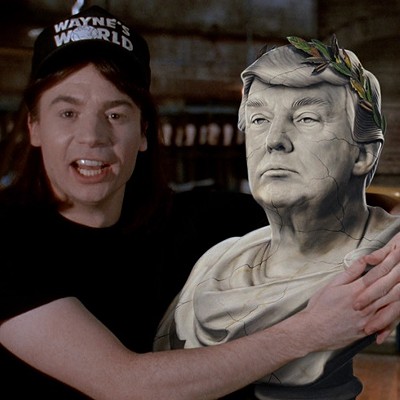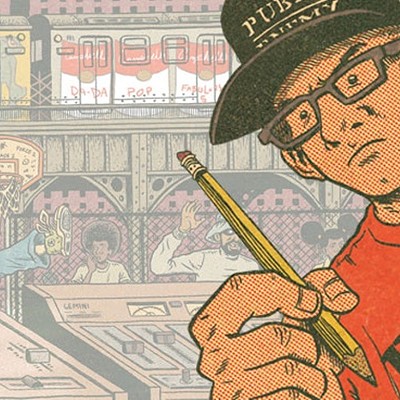DIVINE INTERVENTION
The Quiet Palestinian
I haven't seen many films made from a Palestinian point of view and frankly, neither have you. So if nothing else, Elia Suleiman's Divine Intervention is a timely cinematic dispatch from a culture that's always in the news but seldom gets more than a sound bite to say its piece.
But Divine Intervention is more than that: an imaginatively styled narrative film poem -- funny, melancholy, surprising and angry (often all at once). As political cinema, it's more than worth its weight in nightly news segments; it's also one of the more elegant and provocative movies you'll find on this year's arthouse circuit.
Suleiman calls his film "a chronicle of love and pain." It opens nevertheless with a bit of Buñuelian dark comedy. On a hill above the shoebox rooftops of what we later learn is Nazareth, a man dressed as Santa Claus struggles upward, burdened by the big basket of gifts. Chased by a group of Arab boys in Western dress, he breathes heavily, tossing toys over his shoulder to slow his pursuers. When he reaches the hilltop, we see there's a carving knife stuck in his ribs.
Nazareth is Suleiman's hometown; a 42-year-old Palestinian from Israel, he spent about half of his adult life in the U.S. and has lived since 1994 in Jerusalem. Parts of Divine Intervention, meanwhile -- including a scene in which a discarded fruit pit explodes an Israeli tank -- were shot in France.
Inevitably this is an autobiographical film, at least in spirit. Like Italy's Nanni Moretti -- who stars in his own diaristic, politically themed semi-narratives such as April and Palombella Rosa -- Suleiman himself is the closest thing to a main character in this series of interwoven vignettes. He is so careful, however, to embed himself in this tapestry that not only does he wait until 20 minutes or so into the film to make his first appearance, he also never says a word during its entire 90 minutes.
There is so little dialogue of any kind in Divine Intervention that you could probably transcribe it all on a cocktail napkin. But it's the silence of "E.S." that is loudest. He is involved in two circumstances. First, he traces the progress of his father, a welder whose home furnishings and shop equipment are repossessed, precipitating a heart attack that lands him in the hospital (Suleiman's own father was a resistance fighter he says was savagely beaten by Israeli soldiers in the '40s). Second, E.S. has a relationship with a beautiful woman (Manel Khader) which consists mostly of them holding hands in a car parked at an Israeli military checkpoint, because she lives in Ramallah and he in Jerusalem.
E.S.'s silence about the outrages he witnesses is of course symbolic, but it's at least as eloquent as his intelligent face, with its mournful eyes -- a face as impassive as those of the stained-glass religious icons adorning the hospital where his father is laid up. His stoicism (like Jacques Tati's, or Buster Keaton's) is the film's touchstone, the thing that makes the absurdity depicted all the more pointedly funny. When a garden is fire-bombed at night, the homeowner exits his abode to extinguish the blaze as calmly as if he were retrieving the day's mail. When Suleiman releases a small red balloon inscribed with the the complacent mug of Yassir Arafat, the balloon floats unmolested through the checkpoint and over Jerusalem's skyline. Is this Arafat a jester -- or merely a joke?
Another scene follows E.S.'s father driving down his street, cursing out all his neighbors to himself even as he waves cheerfully. The humor is biting, and elsewhere the rage and the sorrow is plain, with recurring images of debris being thrown out or burnt, and a man waiting for a bus he knows isn't coming next to a wall with graffiti reading, "I am crazy because I love you."
At least once, though, Suleiman abandons irony and dry wit for a fantasy sequence as delirious as it is unexpected. Israeli gunmen taking target practice are vanquished by one of the targets come to life: a masked female Arab warrior with gravity-defying ninja moves, who survives symbolic martyrdom to defeat her oppressors with well-thrown rocks and a kaffiyeh she wields like a bullwhip. It's impolitic, thrilling and wildly cathartic.
Maybe that scene also depicts the title's "divine intervention," but even though this is a devoutly secular film I'd rather give that honor to Suleiman himself. This is just his second feature film (his first, Chronicle of a Disappearance, showed locally in 2000 as part of that rarest of creatures, a Palestinian film series, at the Carnegie Museum's recently terminated film program). With his contemplative long takes and static camera, and his diagnostic wide and medium shots, Suleiman proves a master of cinematic space with a God's-eye view of human folly. Of course he's human too -- which is why the film's only true close-ups are shots of the hands of E.S. and the woman, each grasping at the other over his car's stick shift, ecstatic in the only contact they're permitted. In Arabic and Hebrew, with subtitles. * * * 1/2
But Divine Intervention is more than that: an imaginatively styled narrative film poem -- funny, melancholy, surprising and angry (often all at once). As political cinema, it's more than worth its weight in nightly news segments; it's also one of the more elegant and provocative movies you'll find on this year's arthouse circuit.
Suleiman calls his film "a chronicle of love and pain." It opens nevertheless with a bit of Buñuelian dark comedy. On a hill above the shoebox rooftops of what we later learn is Nazareth, a man dressed as Santa Claus struggles upward, burdened by the big basket of gifts. Chased by a group of Arab boys in Western dress, he breathes heavily, tossing toys over his shoulder to slow his pursuers. When he reaches the hilltop, we see there's a carving knife stuck in his ribs.
Nazareth is Suleiman's hometown; a 42-year-old Palestinian from Israel, he spent about half of his adult life in the U.S. and has lived since 1994 in Jerusalem. Parts of Divine Intervention, meanwhile -- including a scene in which a discarded fruit pit explodes an Israeli tank -- were shot in France.
Inevitably this is an autobiographical film, at least in spirit. Like Italy's Nanni Moretti -- who stars in his own diaristic, politically themed semi-narratives such as April and Palombella Rosa -- Suleiman himself is the closest thing to a main character in this series of interwoven vignettes. He is so careful, however, to embed himself in this tapestry that not only does he wait until 20 minutes or so into the film to make his first appearance, he also never says a word during its entire 90 minutes.
There is so little dialogue of any kind in Divine Intervention that you could probably transcribe it all on a cocktail napkin. But it's the silence of "E.S." that is loudest. He is involved in two circumstances. First, he traces the progress of his father, a welder whose home furnishings and shop equipment are repossessed, precipitating a heart attack that lands him in the hospital (Suleiman's own father was a resistance fighter he says was savagely beaten by Israeli soldiers in the '40s). Second, E.S. has a relationship with a beautiful woman (Manel Khader) which consists mostly of them holding hands in a car parked at an Israeli military checkpoint, because she lives in Ramallah and he in Jerusalem.
E.S.'s silence about the outrages he witnesses is of course symbolic, but it's at least as eloquent as his intelligent face, with its mournful eyes -- a face as impassive as those of the stained-glass religious icons adorning the hospital where his father is laid up. His stoicism (like Jacques Tati's, or Buster Keaton's) is the film's touchstone, the thing that makes the absurdity depicted all the more pointedly funny. When a garden is fire-bombed at night, the homeowner exits his abode to extinguish the blaze as calmly as if he were retrieving the day's mail. When Suleiman releases a small red balloon inscribed with the the complacent mug of Yassir Arafat, the balloon floats unmolested through the checkpoint and over Jerusalem's skyline. Is this Arafat a jester -- or merely a joke?
Another scene follows E.S.'s father driving down his street, cursing out all his neighbors to himself even as he waves cheerfully. The humor is biting, and elsewhere the rage and the sorrow is plain, with recurring images of debris being thrown out or burnt, and a man waiting for a bus he knows isn't coming next to a wall with graffiti reading, "I am crazy because I love you."
At least once, though, Suleiman abandons irony and dry wit for a fantasy sequence as delirious as it is unexpected. Israeli gunmen taking target practice are vanquished by one of the targets come to life: a masked female Arab warrior with gravity-defying ninja moves, who survives symbolic martyrdom to defeat her oppressors with well-thrown rocks and a kaffiyeh she wields like a bullwhip. It's impolitic, thrilling and wildly cathartic.
Maybe that scene also depicts the title's "divine intervention," but even though this is a devoutly secular film I'd rather give that honor to Suleiman himself. This is just his second feature film (his first, Chronicle of a Disappearance, showed locally in 2000 as part of that rarest of creatures, a Palestinian film series, at the Carnegie Museum's recently terminated film program). With his contemplative long takes and static camera, and his diagnostic wide and medium shots, Suleiman proves a master of cinematic space with a God's-eye view of human folly. Of course he's human too -- which is why the film's only true close-ups are shots of the hands of E.S. and the woman, each grasping at the other over his car's stick shift, ecstatic in the only contact they're permitted. In Arabic and Hebrew, with subtitles. * * * 1/2













